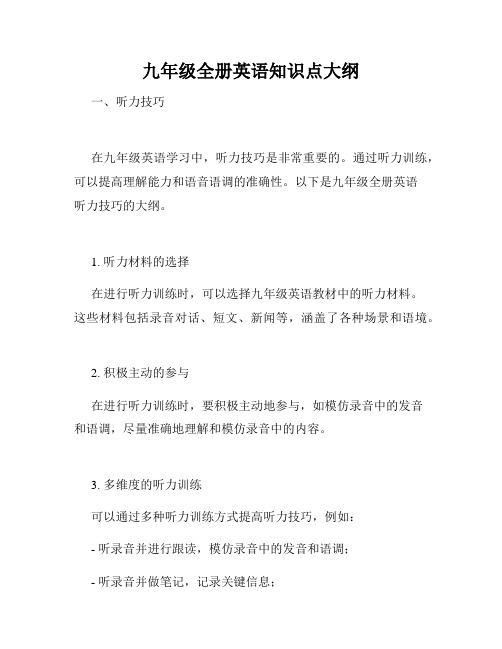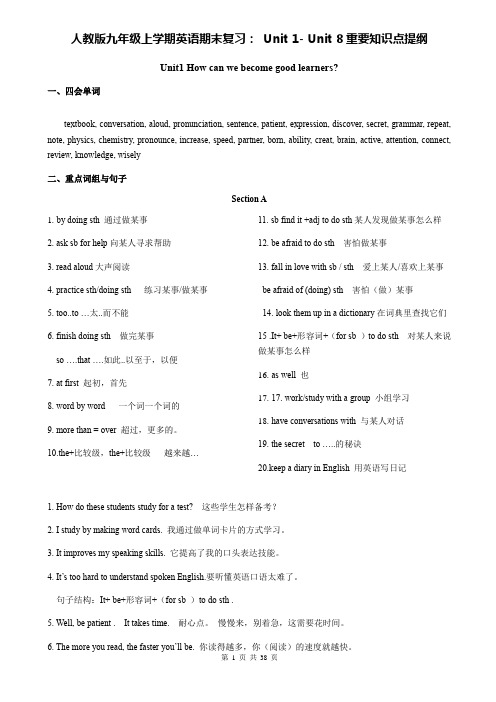九年级上册英语复习提纲
九年级第一学期英语期末复习提纲

九年级英语期末复习提纲Unit 6 When was it invented?★重点单词名词1.款式____________2. 高兴;愉快__________3. 网站___________4. pioneer_____________5. earthquake ___________6. customer_______7. 统治者______________8. 气味_____________9. 冰箱___________ 10. 锁;____________ 11. 疑惑_____________ 12. 英雄__________动词1. 列表_______________2. 提到_____________3. 闻到___________4. 贸易;交易__________5. 怀疑_____________6. 翻译___________7. 分开_______________8. 保持不变__________ 煮沸;烧开_________形容词1. 1. daily_____________2. national___________3. sudden __________4.音乐的______________5. 酸的_____________6. Canadian_________ 副词: 几乎;差不多____________代词:某人_______________★重点短语1. have a point _________________2. 意外地___________________3. take place____________________4. 毫无疑问_________________5. all of a sudden________________6. 错误地;无意中________________7. divide…into__________________8. 不但……而且________________9. be used for doing sth. ___________ 10. 钦佩;仰慕_________________ 11. dream of ___________________ 12. ……的数量__________________ 13. translate...into…_______________14. 掉进_____________________★重点句子1. ---电话是什么时候发明的?---我认为它是在1876年发明的。
九年级全册英语知识点大纲

九年级全册英语知识点大纲一、听力技巧在九年级英语学习中,听力技巧是非常重要的。
通过听力训练,可以提高理解能力和语音语调的准确性。
以下是九年级全册英语听力技巧的大纲。
1. 听力材料的选择在进行听力训练时,可以选择九年级英语教材中的听力材料。
这些材料包括录音对话、短文、新闻等,涵盖了各种场景和语境。
2. 积极主动的参与在进行听力训练时,要积极主动地参与,如模仿录音中的发音和语调,尽量准确地理解和模仿录音中的内容。
3. 多维度的听力训练可以通过多种听力训练方式提高听力技巧,例如:- 听录音并进行跟读,模仿录音中的发音和语调;- 听录音并做笔记,记录关键信息;- 听录音并回答问题,检验理解水平;- 听录音并进行口头表达,提高口语表达能力。
4. 听力测试的准备在九年级的考试中,听力部分通常是重要的一部分。
为了准备听力测试,可以进行模拟考试和练习,熟悉常见的听力题型,并掌握解题技巧。
二、语法知识点九年级的英语学习中,掌握基础的语法知识是非常重要的。
以下是九年级全册英语语法知识点的大纲。
1. 动词时态- 一般现在时- 现在进行时- 一般过去时- 过去进行时- 一般将来时2. 名词- 可数名词与不可数名词- 单数名词与复数名词- 名词所有格的形式和用法3. 代词- 主格代词和宾格代词- 物主代词的形式和用法- 反身代词的形式和用法- 指示代词和疑问代词的形式和用法4. 形容词与副词- 基本形容词的比较级和最高级形式- 副词的比较级和最高级形式- 形容词和副词的修饰和位置5. 时态和语态- 过去完成时- 一般将来时的被动语态- 现在完成进行时- 情态动词的用法和语态三、词汇积累九年级的英语学习中,词汇积累是非常重要的。
以下是九年级全册英语的词汇积累大纲。
1. 拓展词汇量- 通过阅读英语文章、练习课外单词表、参加词汇竞赛等方式扩大词汇量。
- 注意词汇的词义辨析和用法。
2. 同义词和反义词- 学习常见的同义词和反义词,并能正确运用。
九年级上册英语期末复习提纲

九年级上册英语期末复习提纲I. GrammarA. Parts of Speech1. Nouns, pronouns, verbs, adjectives, adverbs, prepositions, conjunctions, interjections2. Determiners: articles, demonstratives, possessives, quantifiersB. Verb Tenses1. Present simple, present continuous, present perfect simple, present perfect continuous2. Past simple, past continuous, past perfect simple, past perfect continuous3. Future simple, future continuous, future perfect simple, future perfect continuousC. Sentence Structures1. Subject-verb agreement2. Simple, compound, and complex sentences3. Active and passive voice4. Reported speech: statements, questions, imperativesII. VocabularyA. Synonyms and Antonyms1. Identify words with similar and opposite meanings2. Use context clues to determine word meaningsB. Word Formation1. Prefixes and suffixes2. Word families: nouns, verbs, adjectives, adverbsC. Idioms and Phrasal Verbs1. Understand and use commonly used idiomatic expressions2. Comprehend and use phrasal verbs in contextIII. Reading ComprehensionA. Fictional Texts1. Identify main ideas and supporting details2. Analyze character development, plot, and conflict in a story3. Make inferences and predictions based on text evidence4. Understand literary devices: similes, metaphors, personification, ironyB. Non-Fictional Texts1. Identify main ideas and supporting details2. Understand text structure: cause and effect, compare and contrast, problem and solution3. Analyze author's purpose, tone, and point of view4. Use context clues to determine the meaning of unfamiliar wordsIV. WritingA. Narrative Writing1. Write a cohesive story with a clear beginning, middle, and end2. Develop characters, setting, dialogue, and plot3. Use appropriate narrative techniques: foreshadowing, flashbacks, suspenseB. Descriptive Writing1. Use vivid language and sensory details to describe people, places, and objects2. Organize ideas logically and coherentlyC. Expository Writing1. Write informative essays, reports, and explanations2. Use evidence and examples to support claims3. Provide clear introductions, body paragraphs, and conclusionsD. Argumentative Writing1. State a clear thesis and present a well-reasoned argument2. Support arguments with evidence and counterarguments3. Acknowledge and address opposing viewpointsV. ListeningA. Understanding Spoken Texts1. Listen for main ideas and specific details in conversations, speeches, and presentations2. Understand different accents and speech patternsB. Responding to Spoken Texts1. Answer questions based on spoken texts2. Participate in discussions and conversationsVI. SpeakingA. Oral Presentations1. Give an organized and coherent presentation on a given topic2. Use appropriate speaking techniques: eye contact, body language, voice projectionB. Expressing and Defending Opinions1. Express personal opinions and support them with reasons and evidence2. Engage in debates and discussions with classmatesVII. Vocabulary and Grammar ReviewA. Practice exercises and quizzes to reinforce vocabulary and grammar conceptsB. Review worksheets and assignments from throughout the semesterC. Seek additional help or clarification on any difficult concepts。
九年级上册英语复习提纲

九年级上册英语复习提纲Unit 1重点词组:1.通过制作单词抽认卡来记忆:制作单词抽认卡2.向某人求助:请求帮助3.大声朗读:朗读4.通过那种方式:以那种方式5.提高我的口语技能:改善我的口语能力6.例如:比如说7.玩得开心:享受乐趣8.与朋友交谈:与朋友交流9.感到兴奋:感到激动10.最终以说汉语结束对话:最终以中文结束对话11.做关于。
的调查:进行。
的调查12.记英语笔记:写英语笔记13.英语口语:口语英语14.犯错误:犯错误15.发音正确:发音准确16.练说英语:练口语17.首先:首先18.以。
开始:从。
开始19.随后:之后20.在课堂上:在课堂上21.嘲笑:嘲笑22.记笔记:做笔记23.喜欢做某事:享受做某事24.写下:记录25.查找:查找26.说本族语的人:母语者27.编造:编造28.全世界:全球29.对待:处理30.担心:担心31.生某人的气:生气32.保持生气:维持愤怒33.消逝:流逝34.把。
当做。
把。
视为。
35.抱怨:抱怨36.把。
变成。
把。
转化为。
37.在。
的帮助下:在。
的协助下38.把。
与。
作比较:将。
与。
进行比较How do you prepare for a test。
This is a n that many students ask themselves。
Some people study by reading textbooks and taking notes。
while others prefer to listen to recordings or watch videos。
Wei Ming。
however。
XXX at all。
He has physical problems with his hearing。
which makes it difficult for him to understand the voice。
Despite this。
he has learned a lot by memorizing the words of pop songs.Wei Ming's experience is different from that of his friend。
九年级上册英语复习提纲

—— and .
A. So has she; so have you B So has she; so you have C So she has; so have you
3. by asking the teacher for help 通过向老师寻求帮助
4. What about reading aloud to practice pronunciation?大声阅读来练习发音怎么样?
5. specific suggestions 具体建议
6. memorize 动词: 记住;熟记
We don’t allow smoking in class. 我们不允许在教室里抽烟。
Students shouldn’t be allowed to smoke in class. 学生不应该被允许在教室里抽烟。
2. get their ears pierced 打耳洞 get sth done; 类似结构 have sth done; 意思是使某事某物被……
I used to get up late, but now I am used to getting up early. 我过去常晚起,但是我现在习惯早起。
2. I’m on the swim team. 我在游泳队里。
3. be interested in sth=take an interest in sth
12. spoken English 英语口语
13. make mistakes in grammar 在语法方面犯错误
14. I don’t know how to use commas. 我不知道怎么用逗号 特殊疑问词+to do
初三上册英语复习提纲

初三上册英语复习提纲第一单元:你好1. 问候和自我介绍的表达方式2. 基本的礼貌用语3. 介绍自己的姓名、年龄、家庭及爱好等4. 询问他人的姓名、年龄、家庭及爱好等5. 课堂用语,如请安静、再见等第二单元:我的家1. 家庭成员的介绍,如父母、兄弟姐妹等2. 家庭成员的职业介绍3. 描述家庭成员的外貌特征和性格特点4. 描述自己的家、房间和家具等5. 描述家庭生活和日常活动第三单元:我的学校1. 学校的基本情况介绍,如学校名称、类型和规模等2. 描述学校的教室、图书馆等地方3. 描述学校的师生以及他们的特点4. 描述学校的课程设置和课程内容5. 描述学校的校园文化和活动等第四单元:我的朋友1. 描述自己的朋友的外貌特征和性格特点2. 描述自己与朋友之间的共同爱好和兴趣3. 描述自己与朋友之间的关系和互动4. 描述与朋友一起参加的活动和经历5. 描述自己对朋友的期望和感受第五单元:我的假期1. 描述自己度假的地方和时间2. 描述自己度假时参观的景点和体验的活动3. 描述度假期间的感受和收获4. 分享与家人或朋友在假期中的快乐时光5. 讲述度假经历中遇到的困难和解决办法第六单元:文化与传统1. 介绍自己所属的国家或地区的文化特点2. 描述传统节日的庆祝方式和相关活动3. 介绍传统饮食和音乐等方面的特色4. 解释并描述重要的传统习俗和民间故事5. 讲述自己对文化传统的理解和感受第七单元:购物与物品1. 描述购物场所的种类和特点2. 描述购物时使用的货币单位和付款方式3. 描述购物常用的英语词汇和表达方式4. 描述喜欢的物品和购物时的选择标准5. 分享购物时的经验和故事第八单元:积极向上1. 描述一些积极的行为和态度2. 分享积极的人物和故事3. 谈论积极的影响和作用4. 分享自己的积极经历和成就5. 讲述如何发展积极心态和战胜困难第九单元:动物世界1. 描述不同种类动物的外貌特征和习性2. 描述不同种类动物的栖息地和生活习惯3. 描述保护动物的重要性和途径4. 分享与动物有关的故事和经历5. 讲述对动物的喜爱和保护动物的行动第十单元:地理环境1. 描述不同地理环境的特点和影响2. 描述不同地理环境的生态系统和生物多样性3. 描述气候和天气的变化以及对生活的影响4. 分享与地理环境相关的旅行经历和感受5. 讲述对地球环境保护的认识和行动以上是初三上册英语复习提纲的大致内容,希望对你有所帮助!。
人教版九年级上学期英语期末复习: Unit 1- Unit 8 重要知识点提纲(全面!)

人教版九年级上学期英语期末复习:Unit 1- Unit 8重要知识点提纲Unit1 How can we become good learners?一、四会单词textbook, conversation, aloud, pronunciation, sentence, patient, expression, discover, secret, grammar, repeat, note, physics, chemistry, pronounce, increase, speed, partner, born, ability, creat, brain, active, attention, connect, review, knowledge, wisely二、重点词组与句子Section A1.by doing sth 通过做某事2. ask sb for help向某人寻求帮助3. read aloud大声阅读4. practice sth/doing sth 练习某事/做某事5. too..to …太..而不能6. finish doing sth 做完某事so ….that ….如此..以至于,以便7. at first 起初,首先8. word by word 一个词一个词的9. more than = over 超过,更多的。
10.the+比较级,the+比较级越来越… 11. sb find it +adj to do sth某人发现做某事怎么样12. be afraid to do sth 害怕做某事13. fall in love with sb / sth 爱上某人/喜欢上某事be afraid of (doing) sth 害怕(做)某事14. look them up in a dictionary在词典里查找它们15 .It+ be+形容词+(for sb )to do sth 对某人来说做某事怎么样16.as well 也17.17. work/study with a group 小组学习18.have conversations with 与某人对话19. the secret to …..的秘诀20.keep a diary in English 用英语写日记1. How do these students study for a test? 这些学生怎样备考?2. I study by making word cards. 我通过做单词卡片的方式学习。
九年级上册期末英语复习提纲

九年级上册期末英语复习提纲【导语】下面是作者为您整理的九年级上册期末英语复习提纲,仅供大家参考。
Unit 4what would you do?1. what if 如果```将会怎么样2. not…in the slightest 一点也不,根本不3. plenty of+(不)可数n / enough+n. 很多的,足够的 4. get along with 与`````相处5 .let sb down 使```败兴或沮丧6 Xe up with=think of=think up 想出7Xe out 出饭, 发表 8. medical research 医学研究 9.wear a tie /necktie 戴领带10. worry about=be worried about 担忧 11. get pimples 得了小脓疱12. take an exam/test (later) 稍后考试13. pass the exam 通过考试 14. fail the exam 考试不合格 15. feel/be confident 感到自信have confidence in sth/dong sth 走某事有自信 16.without permission 未经答应with one’s permission 经过某人许可ask for one’s permission 要求某人的答应 17. bother sb 打扰某人18. not….in the slightest = not….at all 根本不 19. get/be annoyed at sb 对某人动气 20. represent our class 代表我们班级 21Xe up with 想出22.get the medical help 获得医护帮助23.make sb + adj(comfortable) 使某人舒服 24.stay with sb 与某人呆在一起 25.the burned area 受伤的部位 26.(cold) running water (冰) 自来水27.stop doing sth 停止做某事Stop to do sth 停下来做某事 28.have a lot of experience 有许多体会29.be confident of sth 对某物自信 lions of 成百万上千万31.hundreds of 成百上千32.talk to sb about sth 与某人谈论某事33.hide sth from sb 向某人隐藏... ;把... 瞒着某人 34.in a public place =in public 在公共场所 35.make/give a speech 发表演讲36.in the front of (内部) 在````前面in front of (外部) 在```前面 37.talk a lot 健谈38.get nervous 紧张的39.introduce sb to sb 把某人介绍给某人 introduce oneself to sb 向... 作自我介绍 40.do a survey about 做一个..... 的调查 41.hardly ever 几乎不42.borrow sth from sb 从某人那借某物 lend sth to sb 把。
- 1、下载文档前请自行甄别文档内容的完整性,平台不提供额外的编辑、内容补充、找答案等附加服务。
- 2、"仅部分预览"的文档,不可在线预览部分如存在完整性等问题,可反馈申请退款(可完整预览的文档不适用该条件!)。
- 3、如文档侵犯您的权益,请联系客服反馈,我们会尽快为您处理(人工客服工作时间:9:00-18:30)。
九年级上册英语复习提纲【知识梳理】I. 重点短语1. at the moment2. used to3. for a while4. walk away with sth.5. leave for some place6. sooner or later7. pay for8. come up with an idea9. think of10. have a try11. all over the world12. be famous for13. large numbers of14. all the year round15. no matter what16. give up17. for example19. on business20. so far21. come true22. set off23. slow down24. go on doing25. wait for26. be proud of27. be afraid of28. speak highly of29. a year and a half30. half a year31. pick up32. as soon as33. keep… clean34. take care of35. cut down36. make a contribution to37. base on38. make sure40. begin with41. right now42. as soon as possible43. leave a message44. all kinds of things45. walk around46. fall asleep47. wake up48. go on a trip49. have a good time50. take photos51. come out52. come on53. have a family meeting54. talk about55. go for a holiday56 go scuba diving57. write down58. by oneself59. walk along60. get a chance to do sth61. have a wonderful time62. book a room63. have an accident64. be interested in65. use sth. to do sth.66. make a TV show67. be amazed at68. take part in69. feed on70. get out ofII. 重要句型1. Why don’t you do sth.?2. make sb. Happy3. borrow sth. from sb.4. forget to do sth.5. pay fro sth.6. return sth. To sb.7. learn sth. from sb.8. be famous for sth.9. No matter what… 10. be with sb.11. go on doing sth.12. speak highly of sb.13. keep doing sth.14. allow sb. To do sth.15. encourage sb. to do sth. 16. It is said that… III. 交际用语1. --- Excuse me, have you got …?--- Yes, I have. (Sorry, I haven’t.)2. --- Why don’t you …?--- Thanks, I will.3. --- Thanks a lot. (Thank you very much.)--- You are welcome.4. --- Have you ever done…?--- Yes, I have, once. (No, never.)5. --- I’ve just done…--- Really?6. ---What’s …like ?7. --- How long have you been…?--- Since…8. --- Have you ever been to…?--- I’ve never been there. (None of us has./ Only …has. ) 9. --- Would you like to have a try?--- I don’t think I can…10. --- What have you done since…?11. --- How long have you been at this …?--- For…12. --- How long has she/ he worked there…?--- S he’s / He’s worked there for… / all her / his life.13. --- I’m sorry he isn’t here right now.14. --- May I help you?15. --- That’s very kind of you.16. ---Could we go scuba diving?17. --- Could you tell us how long we’re going to be away?18. --- Let’s try to find some information about it, OK?19. --- Could you please tell me how to search the Internet?20. --- Go straight along here.21. ---Please go to Gate 12.22. --- Please come this way.23. --- Could you tell me what you think about Hainan Island?24. --- That sounds really cool!IV. 重要语法1. 宾语从句2. 现在完成时3. 一般过去时与现在完成时的用法比较:【名师讲解】1. Maybe/ may be(1) maybe是副词,意思是“大概,也许”,常用作状语。
Maybe you put it in your bag.也许你把它放在包里了。
“Will he come tomorrow?”“Maybe not.”“他明天来吗?”“也许不”。
(2) may be相当于是情态动词may与be动词搭配一起作谓语,意思是“也许是…,可能是…”。
It may be 9:00 when they arrive.他们可能于九点到达。
The man may be a lawyer. 那人也许是律师。
2. borrow/ lend/ keep/ use(1) borrow表示的是从别人那里借来东西,即我们通常所说的“借进来”。
We often borrow books from our school library.我们经常从学校图书馆借书。
I borrowed this dictionary from my teacher. 我从老师那儿借来了这本字典。
borrow是一个瞬间完成的动作,所以不能与时间段连用。
You can borrow my recorder for three days. ( 错误 )I have borrowed this book for only one week. ( 错误 )(2) lend表示的是把自己的东西借给别人,即我们通常所说的“借出去”。
Thank you for lending me your bike.谢谢你把自行车借给我。
He often lends money to his brother.他经常借钱给他弟弟。
lend与borrow一样,也是一个瞬间完成的动作,不能与一段时间连用。
(3) keep的意思也是“借”,但一般是指借来后的保存或使用阶段,是一段持续的时间,所以能够与时间段连用。
You can keep my recorder for three days.我的录音机你能够借用三天。
I have kept this book for only one week.这本书我才刚借了一星期。
(4) use也能够当“借用”讲,但它的本意是“用,使用”。
May I use your ruler? 我能借你的尺子用一下吗?He had to use this public telephone.他不得不使用这部公用电话。
3. leave/ leave for(1) leave意思是“离开,留下”。
We left Shanghai two years ago.我们两年前离开了上海。
He left his cell phone in the taxi last week.他上周把手机落在出租车里了。
(2) leave for意思是“前往”,表示要去的目的地。
We will leave for Tibet next month.我们将于下月去x藏。
The train is leaving for Moscow.这趟火车即将开往莫斯科。
4. since/ for(1) since用于完成时态,既能用作介词,也能用作连词,后常接时间点,意思是“自从”。
He has been a worker since he came into this city.自从他来到这个城市,他就是工人了。
I have never seen him since we last met in Shanghai .自从我们上次在上海见过之后,我再也没见过他。
since作连词,还有“既然”的意思。
Since you are interested in it, just do it. 既然你对它感兴趣,那就做吧。
You can have fun now since you’ve finished your work.既然你已经做完了功课,就开心玩会儿吧。
(2) for用于完成时,用作介词,后常接一段时间,意思是“经过…”。
I have learned English for five years.我已经学了五年英语了。
They have waited for you for 30 minutes.他们已经等了你三十分钟了。
